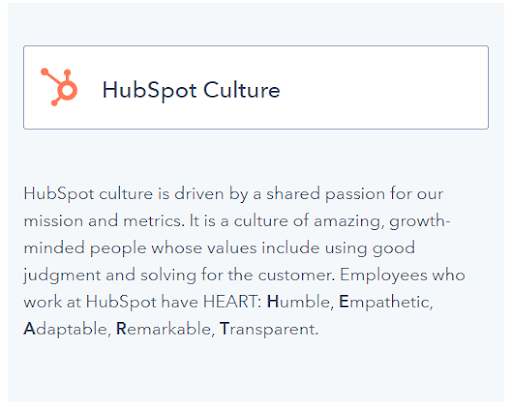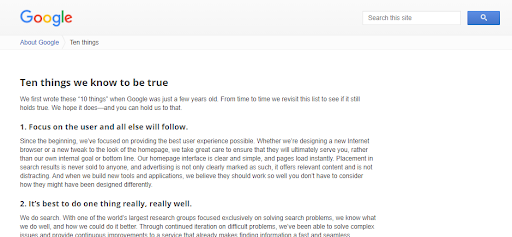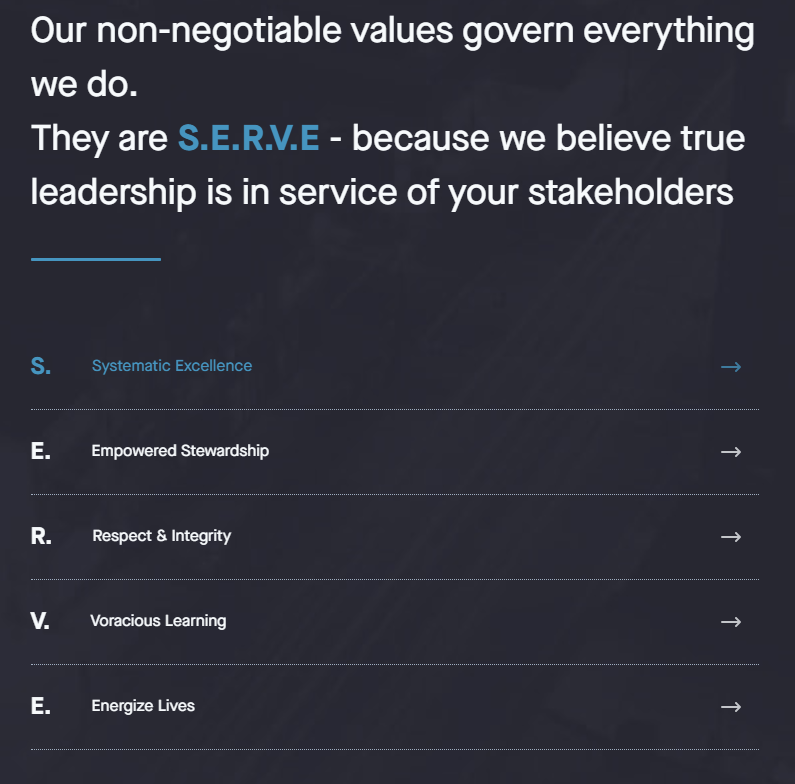- What core values are
- The role core values play in your organizations long-term success
- Examples of some of the best core values and why they work
- How to create core values for your company
- How to use the values you’ve created to implement positive changes in your business
For your business to function in a unique way that brings value to the company and its customers, you need to establish core values.
They serve as binding principles for your company’s culture, identity, direction, and goals.
Before you tap into the benefits of core values for your business, it helps to understand what they are, why you need them, and how to create them.
What are Core Values?
Core values are the fundamental guiding principles and beliefs of an individual or organization. They determine how you do business, how products are created and services are delivered, how goals are set, and the feel of the work environment.
These could be commitment, optimism, giving back, animal rights, diversity, tolerance, etc.
Examples of Notable Core Values
HubSpot

It’s not strange to see companies take a unique swing to the “core values” concept and call it different names. Like HubSpot calls theirs “The HubSpot Culture Code”.It’s so iconic that it’s raked in 5 million views so far.

Google’s guiding philosophy is called “Ten things we know to be true”. They wrote it just a few years after the birth of the tech giant.
According to them, “We revisit this list to see if it still holds true. We hope it does—and you can hold us to that.” The simplicity is endearing.
As market giants in the internet search industry, you can see that they’ve lived up to number 2.
Airbnb

Airbnb has its core values on its careers page. This demonstrates how much it plays a vital role in attracting the kind of job applicants that’ll fit into the company culture, which embraces an attitude of fun.
“Be a Cereal Entrepreneur” shows they’re not afraid to take a fun direction towards things.
Why Does Your Company Need Core Values?
Over 50% of CEOs and CFOs surveyed agreed that corporate culture influences productivity, creativity, profitability, firm value, and growth rates.
That’s just the tip of the iceberg of how phenomenal it is to set guiding values for your company and follow them.
Other reasons are:
Everyone can Decide Independently
When every member of the organization has the company's core values ingrained in their mind, it’s easier to make decisions that fit into company culture without the help or presence of a superior or the founder(s).
If leaders make decisions based on these rules, it trickles down to the team. Employees learn to make decisions in line with the values and reflect the company’s image accurately.
Hire the Right Fit
Since these values define the way of life in your company, you can use them as a screen to find talent that will fit in well. This helps you avoid bad hires and improves your employee retention rate.
If a candidate has a personal philosophy that’s parallel to the guiding philosophy in your company, they’ll fit right in and perform their best. Hence, fostering a better sense of belonging and motivating them to remain with your company longer.
Build a Company Brand

Your brand isn’t your logos, tagline, and colors. A company’s brand is what people feel when they think about your company. Jeff Bezos said it is what people say about you when you leave the room.
Following a set of core values ensures there is uniformity in the perception of your products/services and your company. It helps you make sure you’re portraying to the world the exact image of who you are as people and as leaders.
Inspire Trust and Growth
A company with values is easier to trust. It signifies that you have a reputation to live up to. And when you actually live up to this reputation and that’s recognizable by customers, you attract more of those who agree with you. This drives business growth even faster.
To start tapping into this benefit, let’s show you how to craft your organization’s core values.
Step-by-Step Guide to Creating Your Company Core Values
Agreed, there is no one-size-fits-all way to create your company’s core values. But we’ll show you the steps to get started.
Keep in mind that it's beneficial to consistently review your values and make sure that the company is heading in the direction you have laid out.
Now, the steps:
1. Brainstorm with Your Team

Bring everyone together in a brainstorming environment. If possible, have writing materials for everyone.
Ask them to talk about what the company means to them and what they believe the company should aim for. How do they want to impact the community through the business?
Now, sit back and let them speak. Note the major themes behind what they say. You could hear something linking back to themes like creativity, consistency, reliability, patriotism, etc.
Take notes of these.
Present them back to the group this way “I hear what you’re saying is (insert major theme), is that correct?” Once you have everyone agreeing on a number of themes, you’ve got a starting point.
We recommend keeping your core values to 10 or less so they are easy to remember by all team members.
You can revisit this later to see if everyone is still on the same page.
2. Focus on Those that Fit Your Company’s Mission
Your values will naturally be an extension of your company’s mission (and vision too).
If a core value is going one way and your mission the other, you’ll look like you don’t have your act together to customers and ultimately lose their trust.
So hold your core values up to the light of your company’s mission to see if they tally. For example, Nike’s mission statement is:
Bring inspiration and innovation to every athlete in the world.*
*If you have a body, you are an athlete.
It makes sense that their core values include diversity.
You can look within your mission statement and find pointers to create yours.
3. Filter them Through Deep Questions
Many times these values are simply specific answers to straightforward fundamental questions about your company.
Examples of questions to answer are:
- What matters more to you (and your company) than making money? Could it be environmentalism, social justice, or charity?
- How do you want to position yourself in your industry? Is it through innovation, radical creativity, or being transparent?
- How do you want your employees to feel about work? Do you want them to feel enthusiasm toward work? Should they feel there’s open-mindedness or equality in your company?
- What attitude do you want your team to portray to customers? Respect, good humor, or honesty?
Those are some questions to juggle your mind.
Take time to think deeper about your company’s culture and find that more questions may pop up. With your team, answer them and see if that shifts your core values.
Answers to these questions can help you filter your list and trim it down to the essentials.
4. Sharpen Them
There is no rule that says your guiding principles and ethics should be one word. You can stretch it by a few more words to make them more specific.
But remember to keep it crisp and memorable.
This preciseness will help your core values remain usable, especially in decision-making or when hiring.
For instance, you may be aiming for radical risk-taking and find that a candidate has a more conservative approach to risk-taking and may not be the right fit for the team.
Or they may be people who want a fun and adventurous work environment when you value business-like poise and focus.
5. Research your Market

The answers may lie in your target market and customers. If you’re in business to make a profit, you’d want to have core values that resonate with your ideal customers.
This can be the ultimate test to take your core values through. Will your ideal customer buy from your tech firm if your core value is education?
Of course, first of all, you’d have to get to know your customers.
You can research your market through surveys and interviews. You can learn even more by watching what your competitors are doing and how people respond to it.
This will help you perform the last check on what you and your team brainstormed and land on a refined set of values to live by.
Note that this doesn’t have to be the end of the process. Always revisit them to see if you can change them or if you need to get back on track.
Once you’ve mapped out your values, the next logical step is to use them.
How to Lead from Your Core Values
Teach It
Make your core values the way of life at the workplace. You can have a segment in your onboarding process where this is taught to new hires.
Your team should be able to think about it and apply it in everything they do so that each bit of your business radiates what you actually say you believe in.
Show Example
It’s not enough to teach it.
As a leader in your business, you must show by example. The way you talk to team members, treat customers, and conduct your duties should radiate the principles you’re teaching. This is how Steve Jobs could rally everyone at Apple to “Think Different.”
Make it Memorable
As HubSpot did with their acronym “HEART”, you can do the same with yours. The point is for your employees to have this at the front of their minds when they work.
What’s the use of the core values if your team cannot remember to apply them?
Learn, Unlearn, and Relearn
You may not get your core values spot on the first time you try. Learn from Google’s approach. Revisit your list from time to time and see if your company’s trajectory is still in line with your values.
If you’ve changed your company culture, maybe your core values need to change too. Or maybe you need to get back on track. Either way, having your core values established will give you a compass for navigating the needs or direction of your company and team.
Demo: Acquira Core Values
At Acquira, we started out with the values that mean the most to the leadership team. So, we all took a sheet of paper and wrote the values that had personal meaning for us and that we believe are important for a business to emulate.
Then we narrowed the list down to the top 5 whose initials spelled out S.E.R.V.E., which is our major guiding principle of serving others.

Next, we crafted a personal definition for each value.
For instance, systemic excellence for us means, “We believe excellent outcomes are born from strong systems. Therefore, we are committed to creating extraordinary systems in our personal lives and in business.”
We’ve found that these values have guided the decisions of every person in our organization, from our leadership team to our general managers.
And what’s even better? Outside of the work setting, we’ve seen team members implement these values in their personal lives. It is that impactful.
We can’t stress enough how important it is to have core values to help the team feel a part of something bigger than themselves on a deep level.
In a Nutshell
Core values are the fundamental guiding principles and beliefs of an individual or organization. They help you:
- Get everyone on board with the same decision-making criteria
- Find the right talent that fits into your company's culture
- Build a recognizable brand for your company
- Grow faster as more people trust a company with values
To craft a unique philosophy for your company, you should:
- Brainstorm with your team
- Narrow down on those that fit your company’s mission
- Filter them through deep questions
- Sharpen them, and
- Research your market
When you apply the core principles through teaching and showing examples, it can revolutionize the way you do business, provide direction, and help you hit your company goals faster.
Do you have core values in your company? Share one with us.
If you haven't established your core values yet and you want to, join our Acceleration Program to learn how you can.
Acquira specializes in seamless business succession and acquisition. We guide entrepreneurs in acquiring businesses and investing in their growth and success. Our focus is on creating a lasting, positive impact for owners, employees, and the community through each transition.



